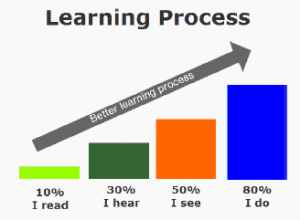 If I asked you: how many percentage of what I say or write in my articles actually lands, accurately in you?
If I asked you: how many percentage of what I say or write in my articles actually lands, accurately in you?
Experiments and tests show that if you have the right attitude, high level of interest, and you are coherent: you can receive as much as 7% of what is being said. Word based communication.
Re-listening or re-reading the same thing won’t improve the percentage much. Why? Because what you think is there replaces, effectively, what you hear or read the second time.
This is what is normal.
What is also normal is to believe that you got 100%. And for the speaker to think that you can get more than 7%.
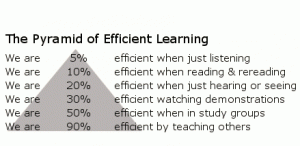 I don’t often put myself into the position of experiencing this directly… and every time I find out how little of what I said actually landed, I want to tear my hair out.
I don’t often put myself into the position of experiencing this directly… and every time I find out how little of what I said actually landed, I want to tear my hair out.
I am as often on the other side of the equation: and I have a lot more tolerance for myself getting mighty little from what I hear and what I read.
I am re-reading the ground breaking new book “Feelings” by Margoczi. I am reading it now in Hungarian. (I paid four times more for that… Makes no sense…) I find that I have glossed over what were technical terms the first time. I was looking for a grasp of the principles, and completely lost the details.
So this time I am clear I got nothing much of a whole lot… lol. 7%. It’s both a lot and very little
So my idea that I’d be able to teach this to my students was based on an illusion… that I can teach what I never got.
This is a very frequent phenomenon, in my experience. People do a course, and want to turn around and teach it. Become a coach. Create their own programs.
In the Advanced Course in Landmark Education, there is a session, 2-3 hours long, maybe longer, Where the assignment is to work with one simple distinction, and take it to a level where you actually are able to say it with authenticity…
My observation, based on watching thousands of participants, that a square number of 1 in 100 is able to get to that level… but 99% of those lose it by the end of the day, or the latest by next day.
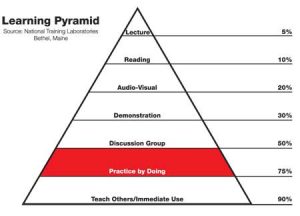 So if your experience is that your ability to learn is disappointing, you are at least honest with yourself. Or intelligent enough to know that you got mighty little for your efforts.
So if your experience is that your ability to learn is disappointing, you are at least honest with yourself. Or intelligent enough to know that you got mighty little for your efforts.
That 93% of what you think you got is b.s. or just simply “not that”. Not what was said.
You could increase your learning effectiveness if you used common sense, but that is the rarest of the capacities for today’s humans.
Common sense means: checking if what you got makes sense in different sizes of pictures and frames.
He paid. the tab should have been 50 Hungarian units of money… but he paid. He did not use common sense… though he probably wondered… but not enough.
I wasn’t knocked awake until the end of my shift when I had a ton of money left after I paid for the total of my checks.
Using common sense falls in the category of a principle: trust but verify…
You either trust and can be duped, or you don’t trust. Hardly anyone I know uses common sense to verify.
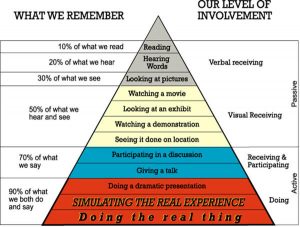 As a university student I increased my learning effectiveness by teaching what I just read/learned. We were a group of four girls, and we got together for a day or two of studying together before every exam. I was considered by them smart, because of the role I took on: teaching them. I got one big benefit from it, other than good grades: I actually still remember most of what we learned, while they all forgot it all.
As a university student I increased my learning effectiveness by teaching what I just read/learned. We were a group of four girls, and we got together for a day or two of studying together before every exam. I was considered by them smart, because of the role I took on: teaching them. I got one big benefit from it, other than good grades: I actually still remember most of what we learned, while they all forgot it all.
What else can you do?
Another useful way to increase how much knowledge lands on you accurately, and how big a knowledge base you build: reading.
Books.
The more you read the more foundation you build.
Re-reading the same thing isn’t the best way to go, even though I just shared that that is what I am doing.
I am doing it for two reasons: I am talking to the author in email, and I am very motivated to get closer to his knowledge level…
Second: I want to turn around and teach it. I just wished I still had the group of girls: I have not one person in my environment who is motivated to learn pretty much anything… unless it is personal and about themselves. For the sake of knowledge: not even one.
I am even having a hard time getting people to read Dr. Wallach’s books, or watch his famous “Dead Doctors Don’t Lie” presentation on youtube.
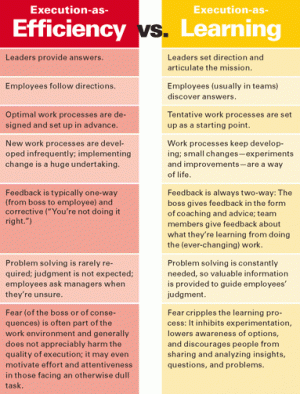 They want me to read, they want me to watch, and then just tell them the 2-minute version, the part that personally effects them.
They want me to read, they want me to watch, and then just tell them the 2-minute version, the part that personally effects them.
When I say “they” I obviously mean you.
Wallace D. Wattles calls this “intellectually slothful”.
He said it, not me.
Yesterday my Canadian friend sent me a link to an article on gizmodo… “The Untold Story of Napoleon Hill, the Greatest Self-Help Scammer of All Time” I put a sample of the article in the footnotes ((
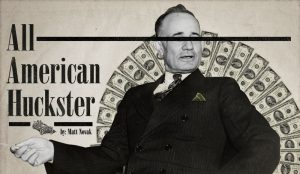
The Untold Story of Napoleon Hill, the Greatest Self-Help Scammer of All Time
Napoleon Hill is the most famous conman you’ve probably never heard of. Born into poverty in rural Virginia at the end of the 19th century, Hill went on to write one of the most successful self-help books of the 20th century: Think and Grow Rich. In fact, he helped invent the genre. But it’s the untold story of Hill’s fraudulent business practices, tawdry sex life, and membership in a New York cult that makes him so fascinating.
That cult would become infamous in the late 1930s for trying to raise an “immortal baby.” But even those who know the story of Immortal Baby Jean may not know that the cult was inspired by Hill’s teachings, practically using his most famous work as their holy text. Don’t worry, the whole story of Napoleon Hill only gets weirder from there.
Modern readers are probably familiar with the 2006 sensation The Secret, but the concepts in that book were essentially plagiarized from Napoleon Hill’s 1937 classic Think and Grow Rich, which has reportedly sold over 15 million copies to date. The big idea in both: The material universe is governed quite directly by our thoughts. If you simply visualize what you want out of life, those things and more will be delivered to you. Especially if those things involve money.
The past few decades have been a profitable era for all sorts of self-help and business success books. Napoleon Hill blazed a trail for an entire industry. But Napoleon’s early work is seen as “the source” when people get deep into self-help and business success literature. Hill’s Think and Grow Rich is passed around in certain business and real estate circles like some kind of ancient text. In fact, when The Secret emerged on the scene in the mid-2000s, countless entrepreneurial writers would pen their own books, pointing to the works of Napoleon Hill as the true basis for what The Secret called the Law of Attraction.
Continue reading
Take a look at the comments as well… the scrambling, the protest… oy vey))
Billions of people got hooked on the power of word, on creating the future, and other garden variety crap he taught.
Do you suppose it would have happened had people used common sense? I don’t think so.
But it used this intellectual slothfulness of yours and increased it many-fold. Because it promised that you can get rich without working, you can get knowledge without learning, that you can become worth a damn just by wishing it.
OK, let’s talk a little bit about the 67 steps program I use to raise your vibration. OK?
Tai Lopez is a guy who has read thousands of books, and managed to distill guidance, principles, etc. from them. Some correctly, some half correctly, some incorrectly.
His vibration is 170, which number shows that his map of reality doesn’t match reality very well. His conclusions in different areas are way off.
And yet, when you use the program the way I suggest that you do, your life can get a huge boost from it. You can make up for decades of slothful living through this program.
How do I suggest that you listen? As if you were taking a shower. Or as if you were at the eye doctor, and in the dark room the doctor’s flashlight would go from picture to picture on the wall.
Given that the truth value of what is says if only 30%, certain steps lower!, you want to pay attention to the directing aspect of his program, and not the LANDING aspect.
Those of my students that listen, and re-listen, transcribe, take notes, are getting the least benefit out of the program. Why? Because they go for the content and not the direction, the context.
When you listen for the context, your left brain is asleep… and allows your intelligent part of you to hear and get impressed.
And when you listen that way, you get almost 100% of what is being said, and can live from it.
It’s not the easiest thing for humans, but it is possible, Some of my students are getting better at it.
You should try…
Read the original article: If I asked you: how many percentage of what I say or write in my articles actually lands accurately in you? Books? Lectures?